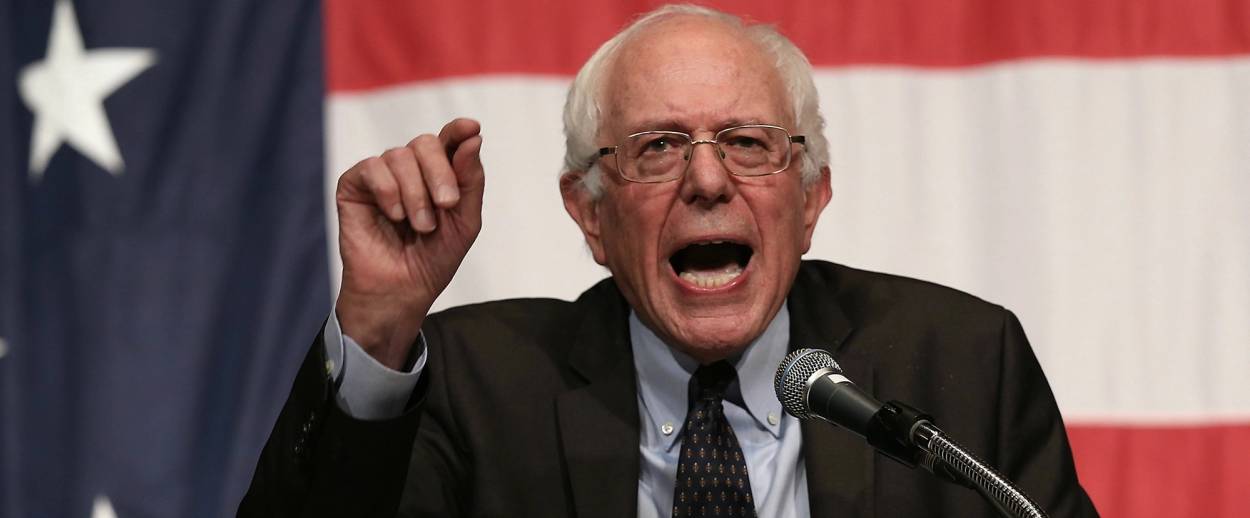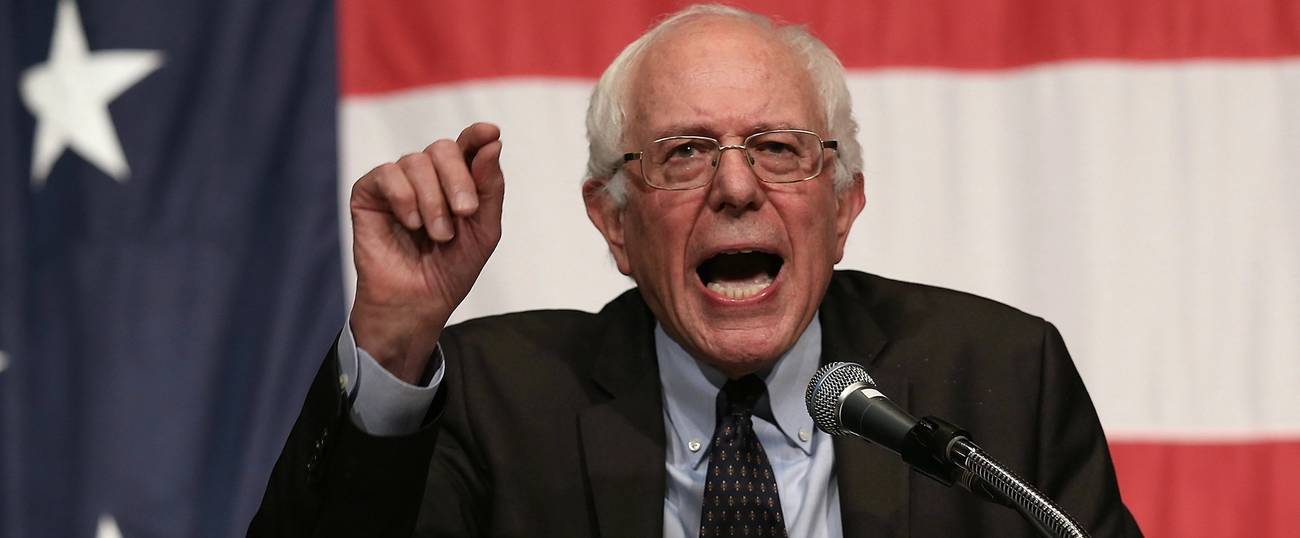Next Time Bernie Sanders Is Asked About Jeremy Corbyn’s Labour Party, He Should Raise Its Anti-Semitism Problem
The senator has experienced the very anti-Semitic attacks that have proliferated in Labour, and is perfectly positioned to call them out




Last Monday, the leftist publication Jacobin published an informative interview with progressive political trailblazer Bernie Sanders. For most of the conversation, the Vermont senator fielded the usual questions about his preferred policies and electoral strategies. But at the end, Sanders was asked about another prominent leftist politician: the British Labour Party’s Jeremy Corbyn.
“What lessons might the U.S. learn from the fight in the U.K. against Theresa May, led by the Labour Party under Jeremy Corbyn?” asked Jacobin’s Daniel Denvir. Sanders reasonably replied that Corbyn’s better-than-expected electoral showing in the June 2017 U.K. elections demonstrated that progressive policies have more electoral cachet than some might think. “Corbyn ran a very smart campaign,” he said. “It was not unlike what we are trying to do in this country. … He came forward with a very progressive agenda that caught the imagination of workers and young people alike. They ended up not winning, but doing a heck of a lot better than people had expected that they would.”
There’s nothing wrong with this answer. But there is something missing: any reference to the ugly cascade of anti-Semitism scandals that have plagued the Labour Party under Corbyn, such that only 13 percent of British Jews have said they’d be willing to vote for them. Indeed, on the same day that the Sanders interview was published, 66 of Britain’s top rabbis signed an unprecedented open letter decrying anti-Semitism in the Labour Party. “As British rabbis, it is with great regret that we find it necessary to write, yet antisemitism within sections of the Labour Party has become so severe and widespread that we must speak out with one Jewish voice,” the rabbis wrote. “The Labour Party’s leadership has chosen to ignore those who understand antisemitism the best, the Jewish community. By claiming to know what’s good for our community, the Labour Party’s leadership have chosen to act in the most insulting and arrogant way.”
The letter was not just unprecedented because it explicitly called out a single political party for coddling Jew hatred, but because its signatories ranged from ultra-Orthodox to Reform, politically conservative to avowedly progressive. As journalist Eylon Aslan-Levy wryly put it, “Jeremy Corbyn scares British Jews so much, he’s pushed ultra-Orthodox rabbis into cosigning a letter with female rabbis.”
So, what exactly has so spooked British Jewry? In this case, it was the Labour Party executive committee’s rejection of the IHRA official definition of anti-Semitism. The definition is the work of numerous NGOs, researchers, and Jewish groups, and has been adopted by 31 countries—including 24 European countries, the European Parliament, and the U.K. itself. It offers clear guidance as to what constitutes hate crimes against Jewish people. Unlike most countries in the E.U., however, the Labour Party’s leadership decided to water down the definition and omit several of its examples most often found in Labour’s ranks. Essentially, they denied Jews the right to define their own oppression, something no serious leftist party would ever do to any other minority community.
For Labour’s leadership, however, singling out Jews for special mistreatment has unfortunately become a pastime. Corbyn himself has donated to a notorious Holocaust denier, defended a bigot who claimed the Mossad did 9/11, and invited an extremist cleric who claimed Jews cook Passover matzo with gentile blood to parliament. Whether this was the result of negligence or malevolence, it was not lost on Britain’s anti-Semites, who flocked to Corbyn’s banner. Some of these Labour officials blamed Jews and Israel for the African slave trade, ISIS, and even the Sandy Hook massacre. Corbyn confidante and former London mayor Ken Livingstone bizarrely claimed that Hitler was a Zionist, among other bigoted canards, yet the party’s disciplinary committee refused to expel him. This compelled 100 of Labour’s own MPs to publicly denounce their party for failing to confront anti-Semitism. In March, over a thousand Jews took the unprecedented step of flooding Parliament Square to protest the Labour Party’s tolerance of anti-Semitism.
It was hoped that Labour’s National Executive Committee would finally crack down on such conduct by adopting a robust definition of anti-Semitism and enforcing it. These hopes proved to be misplaced. The party initially appointed Christine Shawcroft as its chief disciplinary official, who was quickly forced to resign after it was revealed that she had defended a Holocaust denier. Her replacement was not much better, and ultimately, the party moved toward a bowdlerized definition of anti-Semitism, in defiance of the international consensus, leading to widespread outcry from Jews and others on the left, from rabbis to columnists to former Labour leaders:
I am honestly almost speechless about Labour’s behaviour re anti-Semitism. No longer even any pretence this is for Jewish voters because Jewish leaders have made their feelings v clear, and they rejected them.
— Hadley Freeman (@HadleyFreeman) July 17, 2018
So when it comes to antisemitism, Labour puts aside the view of every mainstream Jewish organisation in the UK, 68 rabbis from every strand of Jewish life, the view of governments across Europe – and decides it knows better https://t.co/D7fjsYCvXn
— Jonathan Freedland (@Freedland) July 17, 2018
Labour should adopt the full IHRA definition. The argument that it is somehow incompatible with criticising the actions of the Israeli government is wrong. The views of the vast majority of the Jewish community are very clear. I would urge the NEC to get on with this at speed. https://t.co/cqsiyZE8wC
— Ed Miliband (@Ed_Miliband) July 17, 2018
Just yesterday, the longtime treasurer of Corbyn’s own Labour constituency in Islington resigned, saying: “I am happy to support a party which is a force for good even if I have some differences, but I am no longer sure that the Labour Party is a force for good. … The Labour Party has become somewhere anti-Semites feel comfortable and where many Jews feel uncomfortable—I hope I can join again when it is the other way around.”
What does any of this have to do with Bernie Sanders? Nothing and everything. Sanders is under no obligation, of course, to address the issue. It’s entirely possible that he might not even be aware of Labour’s anti-Semitism woes, given that they’ve been transpiring overseas. But as Sanders is one of the most prominent progressive and Jewish voices in global politics, his intervention could truly make a difference. A condemnation of the Labour leadership’s cavalier attitude toward anti-Semitism would be impossible to ignore in Britain, and it would also draw a line in American progressive circles as to what constitutes acceptable treatment of Jews.
It’s a message Sanders is uniquely qualified to give. After all, the senator is no stranger to anti-Semitism. He repeatedly encountered it himself on the campaign trail, whether from bigoted questioners at his events or mainstream radio hosts. In fact, Sanders was subjected to exactly the sort of anti-Semitic attack that Labour’s new rules claim is not, in fact, anti-Semitic. In June 2015, Sanders was interrogated by NPR’s Diane Rehm about his nonexistent Israeli citizenship. Rehm cited an internet list of American Jewish lawmakers who allegedly were secretly Israeli. (None of them are.) She later apologized. Such anti-Semitic dossiers have long circulated online in the far-right and far-left fever swamps, used to attack the loyalties of Jews by extremists on both sides. Most recently, they were deployed by leftist opponents of U.S. Rep. Jared Polis in his ultimately successful campaign for the Democratic gubernatorial nomination in Colorado.
Such slurs on Jewish loyalties date back to the Middle Ages and are deemed explicitly anti-Semitic under the IHRA definition. Under Labour’s neutered definition, however, they are not. As Dave Rich, head of Britain’s chief anti-Semitism watchdog, writes:
In the Labour code it is no longer likely to be antisemitic “to accuse Jewish citizens of being more loyal to Israel, or to the alleged priorities of Jews worldwide, than to the interests of their own nations”. The code simply says this is “wrong”, as if imprecise or uncivil language is the problem, rather than the prevalence of antisemitic attitudes. Yet this charge, that Jews cannot be trusted or must always be suspected of having a hidden agenda, is central to the old-fashioned, rightwing antisemitism that the Labour party claims to oppose.
In other words, the anti-Semitic inquisition of Sanders would have been kosher, if misguided, under Labour’s proposed rules.
But it doesn’t have to be this way, if the right people speak up. Bernie Sanders is one of them. He knows the toxic nature of anti-Semitic hate from personal experience, and how it is designed to exclude Jews from political life by undermining their very legitimacy. Hopefully, the next time he gets asked about Corbyn’s Labour, he’ll take the opportunity to teach its members the same lessons he has learned the hard way.
Yair Rosenberg is a senior writer at Tablet. Subscribe to his newsletter, listen to his music, and follow him on Twitter and Facebook.